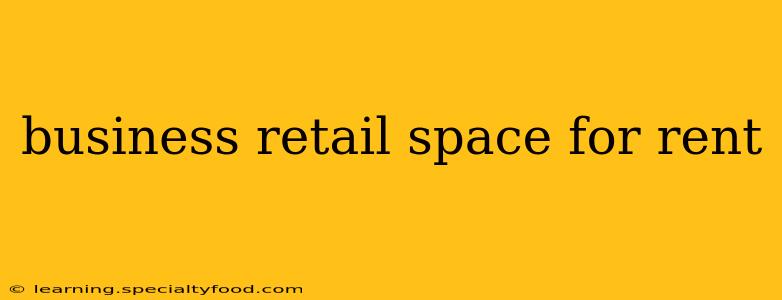Finding the ideal retail space for your business can feel overwhelming. The right location is crucial for success, impacting everything from foot traffic and brand visibility to operational costs and overall profitability. This guide will walk you through the essential steps to finding the perfect retail space for rent, answering common questions along the way.
What factors should I consider when looking for retail space for rent?
This is a fundamental question, and the answer is multifaceted. Several key factors must be considered before signing a lease. These include:
-
Location, Location, Location: This age-old adage remains true. Analyze foot traffic, demographics (target customer profile), nearby businesses (complementary or competitive), accessibility (parking, public transport), and overall visibility. A prime location often justifies a higher rent, but the increased exposure and potential for sales can make it worthwhile.
-
Size and Layout: The space needs to accommodate your business operations effectively. Consider the required square footage for display, storage, staff areas, and customer flow. An efficient layout maximizes space utilization and enhances customer experience.
-
Lease Terms: Carefully review the lease agreement, understanding all clauses, including rent amount, lease duration, renewal options, responsibilities for maintenance and repairs, and permitted uses of the space. Seek legal advice if needed.
-
Rent and Expenses: Beyond the base rent, consider additional expenses like property taxes, insurance, utilities, and common area maintenance (CAM) fees. Calculate your total monthly costs to ensure they align with your budget.
-
Condition of the Space: Assess the condition of the space, identifying any necessary renovations or repairs. Factor these costs into your budget and negotiate with the landlord if improvements are needed. Consider the building's overall condition and any planned maintenance or upgrades.
-
Accessibility and Amenities: Ensure the space is accessible to customers with disabilities, complying with ADA regulations. Consider the availability of amenities like restrooms, loading docks, and ample parking.
What are the different types of retail spaces available for rent?
The type of retail space you need depends on your business model and target market. Options include:
-
Standalone Stores: These offer complete control over the space and branding but often come with higher upfront costs and responsibilities.
-
Shopping Malls and Centers: These offer high foot traffic and shared amenities but often have strict regulations and lease terms.
-
Street-Level Retail Spaces: These provide high visibility and accessibility but may have limited parking.
-
Pop-up Shops: These are temporary retail spaces, ideal for testing a new market or product before committing to a long-term lease.
How do I find retail spaces for rent in my area?
Several resources can help you locate available retail spaces:
-
Commercial Real Estate Brokers: They have access to a wide range of properties and can assist with negotiations.
-
Online Listings: Websites specializing in commercial real estate listings provide detailed information and photos.
-
Local Networking: Connect with other businesses and industry professionals in your area.
-
Direct Contact with Landlords: Identify potential properties and contact the owners directly.
What are the common lease terms I should be aware of?
Lease agreements can be complex. Key terms to understand include:
-
Base Rent: The monthly rent amount.
-
Lease Term: The duration of the lease agreement.
-
Renewal Options: Terms for extending the lease.
-
Security Deposit: A deposit to protect the landlord against damages.
-
Permitted Uses: Restrictions on how the space can be used.
-
Responsibility for Repairs and Maintenance: Clarifies who is responsible for maintaining the property.
What questions should I ask a potential landlord?
Before signing a lease, ensure you ask comprehensive questions, including those regarding:
-
Utilities: Who is responsible for paying for utilities (water, electricity, gas)?
-
Insurance: What types of insurance are required?
-
Taxes: Are property taxes included in the rent?
-
Maintenance: Who is responsible for maintaining the property?
-
Renovations: Are renovations permitted? If so, who pays for them?
-
Parking: Is there adequate parking for customers and staff?
Finding the perfect retail space takes time and effort. By carefully considering these factors and asking the right questions, you can increase your chances of securing a location that supports your business's growth and success. Remember to always seek professional legal and financial advice before committing to a lease.
